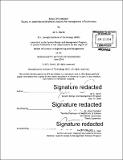| dc.contributor.advisor | Alex Pentland. | en_US |
| dc.contributor.author | Kamil, Ali S. (Ali Syed) | en_US |
| dc.contributor.other | Massachusetts Institute of Technology. Engineering Systems Division. | en_US |
| dc.date.accessioned | 2017-01-06T16:13:58Z | |
| dc.date.available | 2017-01-06T16:13:58Z | |
| dc.date.issued | 2016 | en_US |
| dc.identifier.uri | http://hdl.handle.net/1721.1/106253 | |
| dc.description | Thesis: S.M. in Engineering and Management, Massachusetts Institute of Technology, School of Engineering, System Design and Management Program, Engineering and Management Program, 2016. | en_US |
| dc.description | Cataloged from PDF version of thesis. "June 2016." | en_US |
| dc.description | Includes bibliographical references (pages 88-90). | en_US |
| dc.description.abstract | How can we construct socio-technical system such that they constantly evolve to improve themselves? This is the central question of this thesis. We propose a "senseable Kaizen" philosophy. This involves the central tenets of the Kaizen strategy while incorporating passive and active sensing data collection to analyze the easily missed social cues critical to understand and improve a socio-technical system. We test our hypothesis by applying it to three disparate systems ranging in size, complexity, and processes. In the LVPEI experiment, we identified that prolonged patient wait times were the outcome of the lack of adherence to appointment-based system. Only 33% of the patients showed up on time. The large volume of walk-in patients resulted in build-up of patients during peak-times (11am - 3pm) this contributed to 23% drop in time for patient work-up, 39% drop in patient-doctor time, and 16% increase in cross-referrals for patients. To compensate the staff worked 24% over their allotted hours. In Santiago, Chile working with urban logistics carriers, we found that the institutional knowledge of drivers plays a key role in understanding and building delivery routes. Only 53% of the drivers adhered to the "optimized" route provided to them by the dispatcher. Traffic congestion, delays at customer sites, familiarity with the customer, and on-site parking led to drivers making decisions that best suited their needs. At the Roskilde Music Festival experiment, we use crowdsourcing to collect data incidents that go unreported at a large gathering. We learned about the close social ties that develop due to the shared experience of festival attendees and the need to preserve privacy and security of users in a platform like ours. Finally we propose a refined model of Kaizen strategy incorporating a "living lab" approach to managing socio-technical systems. We portray a world where socio-technical systems are continuously evolving using the bytes of data collected from an open innovation ecosystem. | en_US |
| dc.description.statementofresponsibility | by Ali S. Kamil. | en_US |
| dc.format.extent | 90 pages | en_US |
| dc.language.iso | eng | en_US |
| dc.publisher | Massachusetts Institute of Technology | en_US |
| dc.rights | M.I.T. theses are protected by copyright. They may be viewed from this source for any purpose, but reproduction or distribution in any format is prohibited without written permission. See provided URL for inquiries about permission. | en_US |
| dc.rights.uri | http://dspace.mit.edu/handle/1721.1/7582 | en_US |
| dc.subject | Engineering and Management Program. | en_US |
| dc.subject | System Design and Management Program. | en_US |
| dc.subject | Engineering Systems Division. | en_US |
| dc.title | Bytes of Evolution : essays on applying social physics lessons for management effectiveness | en_US |
| dc.type | Thesis | en_US |
| dc.description.degree | S.M. in Engineering and Management | en_US |
| dc.contributor.department | Massachusetts Institute of Technology. Engineering and Management Program | en_US |
| dc.contributor.department | System Design and Management Program. | en_US |
| dc.identifier.oclc | 961940344 | en_US |
